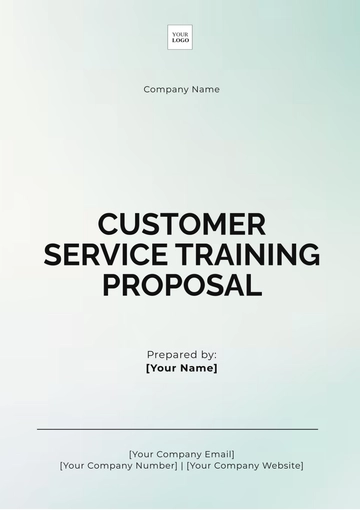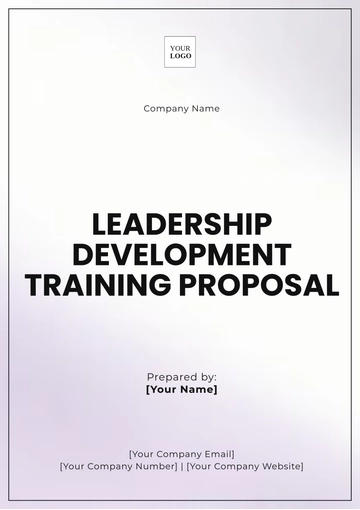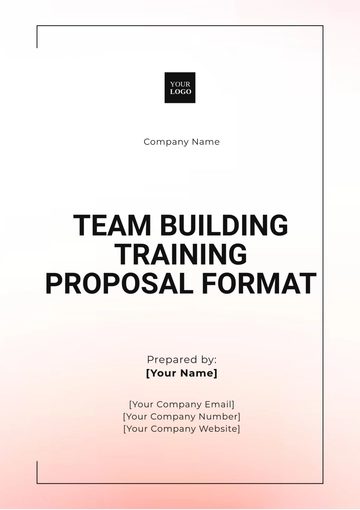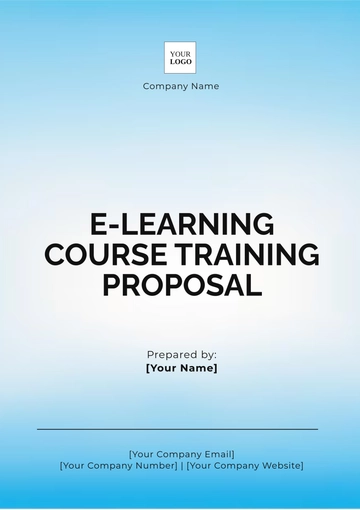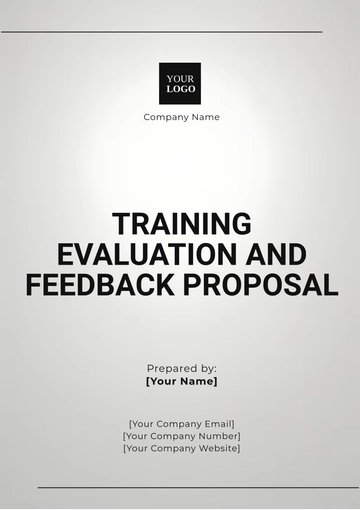Free New Sales Training Methods Proposal

[Date]
[Recipient Name]
[Recipient Title]
[Recipient Company Name]
[Company Address]
[City, State, Zip Code]
Dear [Recipient Name],
I am writing to you on behalf of [Your Company Name] to present a proposal that promises to revolutionize the way we approach sales training within our organization. As we navigate through an ever-evolving business landscape, the need to adapt and enhance our sales strategies has never been more critical. It is with this understanding that we propose the implementation of new sales training methodologies designed to elevate our sales efficiency, productivity, and overall customer satisfaction.
Executive Summary
In the rapidly evolving business environment, staying ahead requires not just meeting but exceeding market demands and customer expectations. Recognizing this, [YOUR NAME], on behalf of [YOUR COMPANY NAME], proposes an ambitious initiative to overhaul and enhance our sales training methodologies. Our analysis has pinpointed a critical need for advancement in our training protocols to not only keep pace with industry standards but to set new benchmarks for sales efficiency, productivity, and customer engagement. This proposal outlines a strategic approach to adopting diversified and cutting-edge training methods aimed at significantly elevating our sales team's performance, strengthening customer relationships, and boosting the overall morale of our team members. By embracing this innovative training initiative, [YOUR COMPANY NAME] is poised to achieve unparalleled sales success and foster a culture of continuous improvement and excellence.
Objectives
The primary goals of this proposal are threefold:
Formulate and Implement New Sales Training Methodologies: We aim to revolutionize our current sales training approach by introducing and applying novel methodologies that are tailored to meet the unique needs of our sales force and the dynamic challenges of the marketplace.
Increase Efficiency and Productivity of the Sales Team: By equipping our sales team with advanced skills and knowledge through state-of-the-art training programs, we anticipate a significant boost in their operational efficiency and productivity. This enhancement will enable our team to navigate sales processes more effectively, thereby increasing output and achieving better results.
Improve Customer Satisfaction and Sales: At the heart of our initiative is the desire to deepen our customer relationships through improved service quality. By refining our sales team's approach to customer engagement, we expect to see a marked improvement in customer satisfaction, leading to increased loyalty, higher sales conversions, and growth in overall sales figures.
Methodology
Achieving the aforementioned objectives requires a comprehensive and meticulously planned approach. Our methodology encompasses the following key strategies:
Conducting In-depth Research: We will initiate our plan by undertaking thorough research to identify the latest and most effective sales training techniques available. This research will involve analyzing successful training programs in various industries, consulting with sales training experts, and leveraging insights from academic and professional studies on sales effectiveness.
Integrating Technology into the Training Process: Recognizing the transformative power of technology in learning and development, we will incorporate innovative technological tools into our training regimen. This could include the use of virtual reality (VR) for immersive role-playing scenarios, artificial intelligence (AI) for personalized learning experiences, and digital platforms for interactive learning modules and assessments.
Providing Practical, Hands-on Training Sessions: To ensure the practical applicability of our training, we will focus on hands-on sessions that allow sales team members to apply what they have learned in real-world scenarios. These sessions will be designed to challenge our sales personnel, encouraging them to think critically, adapt to various sales situations, and hone their negotiation and customer service skills.
Project Scope
The scope of this proposal is comprehensive, covering all aspects of the introduction and implementation of new training methodologies within [YOUR COMPANY NAME]. Key components of the project include:
Sales Team Training: Central to our proposal is the rollout of the new training program to all sales team members. This training will be phased and tailored to accommodate the diverse roles and experience levels within the team.
Feedback Collection: To gauge the effectiveness of the training and identify areas for improvement, we will implement a structured feedback collection process. This will involve gathering input from participants throughout the training sessions and after they have had the opportunity to apply their learnings in the field.
Performance Analysis: The final phase of our project involves a detailed analysis of the training's impact on sales performance. By comparing key sales metrics before and after the training, we will assess the program's effectiveness in achieving its stated objectives. This analysis will inform future training initiatives and adjustments to ensure continuous improvement and alignment with [YOUR COMPANY NAME]'s strategic goals.
This proposal represents a strategic investment in the professional development of our sales team and the long-term success of [YOUR COMPANY NAME]. By adopting innovative training methodologies, we aim to enhance our sales efficiency, productivity, and customer satisfaction, thereby driving sales growth and reinforcing our competitive position in the market. We look forward to the opportunity to move forward with this transformative initiative and achieve the exceptional results that we know are within our reach.
Timeline
The successful rollout of our new sales training methodologies hinges on a well-structured and timely execution plan. To ensure a comprehensive understanding and seamless implementation of the proposed strategies, the project has been divided into distinct phases, each with its own set of goals and timelines. This phased approach allows for meticulous planning, execution, and evaluation, thereby maximizing the effectiveness of the training program and ensuring that our objectives are met within the stipulated time frame.
The following table outlines the timeline for each phase of the project, from the initial research and planning stage to the final feedback collection and performance analysis:
Phase | Duration |
|---|---|
Research and Planning | 1 month |
Development of Training Modules | |
Training Implementation | |
Feedback Collection and Performance Analysis |
This timeline is designed to provide a clear roadmap for the project, ensuring that each phase is allocated sufficient time for thorough and effective completion.
Budget
A crucial element of successfully implementing the new sales training methodologies is the allocation and management of the project budget. Detailed budget planning ensures that all aspects of the training program are adequately funded, from the initial research phase to the final performance analysis. The following budget breakdown provides transparency regarding the estimated costs associated with each task, allowing for informed decision-making and financial oversight throughout the project.
The estimated costs for each phase of the project are detailed in the table below. This budget encompasses all necessary expenditures to achieve the project's objectives, ensuring the development and implementation of a comprehensive and effective sales training program.
Task | Estimated Cost |
|---|---|
Research and Planning | $10,000 |
Development of Training Modules | |
Training Implementation | |
Performance Analysis | |
Total |
This budget reflects our commitment to investing in the professional development of our sales team, with the aim of enhancing sales performance and achieving a significant return on investment. By allocating resources judiciously and monitoring expenditures closely, we ensure that the project remains financially viable and delivers maximum value to the organization.
Benefits and Impact
The implementation of innovative sales training methodologies stands to fundamentally transform the performance and productivity of our sales team. This transformation is not just limited to improved sales figures; it encompasses a wide range of benefits that extend to every facet of our organization's operations and its market positioning. Below, we detail the multifaceted benefits and impact expected from this initiative.
Enhanced Sales Efficiency and Productivity
The primary objective of introducing new sales training methodologies is to enhance the efficiency and productivity of our sales team. By equipping our team members with advanced sales techniques and tools, we anticipate a significant uptick in their ability to close deals and meet sales targets. This improvement in productivity will enable our team to handle a larger volume of sales activities without compromising the quality of customer interactions, thereby maximizing revenue generation opportunities.
Improved Customer Relations
A well-trained sales team is the cornerstone of building and maintaining strong customer relationships. The new training program focuses not only on sales tactics but also on customer service and relationship management skills. This comprehensive approach will empower our sales representatives to understand and meet customer needs more effectively, leading to increased customer satisfaction and loyalty. Happy customers are more likely to engage in repeat business and become brand advocates, further enhancing our market reputation and customer base.
Increased Sales and Revenue
At its core, the expected outcome of this sales training initiative is an increase in sales and revenue. Through improved sales techniques, better customer engagement, and higher productivity, our sales team will be positioned to significantly boost sales performance. This increase in sales will directly contribute to our organization's bottom line, supporting growth and expansion activities, and providing the financial stability needed to invest in future innovations and market exploration.
Potential Risks and Mitigation Strategies
With any initiative of this magnitude, there are inherent risks and challenges that must be addressed to ensure its success. Understanding these potential pitfalls and having a robust plan to mitigate them is crucial. Below we explore some of the anticipated risks and the strategies we will employ to overcome them.
Resistance to Change
One of the most common challenges in implementing new methodologies is resistance to change from the team. This resistance can stem from a variety of factors, including comfort with existing procedures, fear of the unknown, or concerns about the ability to adapt to new techniques.
Mitigation Strategy: To counteract resistance to change, we will engage in transparent communication with all stakeholders from the outset. By clearly articulating the benefits of the new training methods and involving the sales team in the development process, we can foster a sense of ownership and excitement about the changes. Additionally, offering support and resources to ease the transition will help mitigate apprehensions and promote a culture of continuous learning and improvement.
Uncertain Project Outcomes
Another risk is the uncertainty associated with the project outcomes. While we have conducted thorough research and planning, the real-world application of new methodologies may yield unexpected results.
Mitigation Strategy: Regular monitoring and feedback sessions will be crucial in addressing this risk. By establishing clear metrics for success and continuously assessing the program's impact, we can quickly identify areas where adjustments are needed. This iterative approach ensures that the training program remains aligned with our objectives and can evolve in response to feedback and changing market conditions.
Conclusion
The introduction of new sales training methodologies represents a strategic investment in the future success of our organization. By enhancing the efficiency, productivity, and effectiveness of our sales team, we are laying the groundwork for sustained growth, improved customer relations, and increased revenue. The benefits of this initiative are clear and compelling, offering a pathway to achieving a competitive edge in the marketplace.
However, success is not guaranteed without careful consideration of the potential risks and challenges that may arise. By adopting a proactive approach to change management and remaining vigilant in monitoring project outcomes, we can navigate these challenges and realize the full potential of our sales training initiative.
This proposal sets forth a bold vision for transforming our sales operations through innovative training methodologies. It reflects our commitment to excellence, our dedication to our team's development, and our unwavering focus on customer satisfaction. We are confident that with the support and engagement of all stakeholders, this initiative will drive our organization to new heights of success.
Thank you for considering our proposal. We are eager to discuss any aspects of this initiative further and to answer any questions you may have. Your support in this endeavor will be pivotal to its success and the continued growth of our organization.
Sincerely,
[Your Name]
[Your Title]
[Your Company Name]
[Your Company Email]
[Your Company Address]
[Your Company Number]
[Your Company Website]
[Your Company Social Media]
- 100% Customizable, free editor
- Access 1 Million+ Templates, photo’s & graphics
- Download or share as a template
- Click and replace photos, graphics, text, backgrounds
- Resize, crop, AI write & more
- Access advanced editor
Unlock your sales team's potential with our New Sales Training Methods Proposal Template on Template.net. This template offers complete editable and customizable features through our AI editor tool, simplifying the creation of persuasive proposals. Featuring sections for Needs Analysis, Proposed Solution, Evaluation, Pricing, and more, it's your gateway to success in sales training. Don't miss this opportunity to create winning proposals effortlessly.
You may also like
- Research Proposal
- Proposal Request
- Project Proposal
- Grant Proposal
- Photography Proposal
- Job Proposal
- Budget Proposal
- Marketing Proposal
- Branding Proposal
- Advertising Proposal
- Sales Proposal
- Startup Proposal
- Event Proposal
- Creative Proposal
- Restaurant Proposal
- Blank Proposal
- One Page Proposal
- Proposal Report
- IT Proposal
- Non Profit Proposal
- Training Proposal
- Construction Proposal
- School Proposal
- Cleaning Proposal
- Contract Proposal
- HR Proposal
- Travel Agency Proposal
- Small Business Proposal
- Investment Proposal
- Bid Proposal
- Retail Business Proposal
- Sponsorship Proposal
- Academic Proposal
- Partnership Proposal
- Work Proposal
- Agency Proposal
- University Proposal
- Accounting Proposal
- Real Estate Proposal
- Hotel Proposal
- Product Proposal
- Advertising Agency Proposal
- Development Proposal
- Loan Proposal
- Website Proposal
- Nursing Home Proposal
- Financial Proposal
- Salon Proposal
- Freelancer Proposal
- Funding Proposal
- Work from Home Proposal
- Company Proposal
- Consulting Proposal
- Educational Proposal
- Construction Bid Proposal
- Interior Design Proposal
- New Product Proposal
- Sports Proposal
- Corporate Proposal
- Food Proposal
- Property Proposal
- Maintenance Proposal
- Purchase Proposal
- Rental Proposal
- Recruitment Proposal
- Social Media Proposal
- Travel Proposal
- Trip Proposal
- Software Proposal
- Conference Proposal
- Graphic Design Proposal
- Law Firm Proposal
- Medical Proposal
- Music Proposal
- Pricing Proposal
- SEO Proposal
- Strategy Proposal
- Technical Proposal
- Coaching Proposal
- Ecommerce Proposal
- Fundraising Proposal
- Landscaping Proposal
- Charity Proposal
- Contractor Proposal
- Exhibition Proposal
- Art Proposal
- Mobile Proposal
- Equipment Proposal
- Student Proposal
- Engineering Proposal
- Business Proposal


